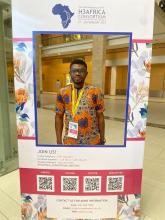Congratulations to Vincent Ntui-Njock, Biochemist and Molecular Biologist, University of Buea, Southwest Cameroon on being the first prize winner at the Fellows Presentations at the 20th H3Africa Consortium Meeting that took place from the 27 to 28 February 2023 in Cape Town, South Africa. We spot him to learn more about his career.
- What is your affiliation?
University of Buea, South West, Cameroon and Medical Research Council the Gambia at London School of Hygiene and Tropical Medicine the Gambia
- What was the title of your presentation at the 20th H3Africa Consortium Meeting?
The title of my presentation was ’LOW PARASITE INFECTION DENSITY AND HIGH ALLELIC FREQUENCIES OF MSP2 IN PLASMODIUM FALCIPARUM ISOLATES FROM PREGNANT ACROSS THE DIFFERENT MALARIA ECO-ZONES IN CAMEROON’’.
- What is your research interest?
My research interest is focus on Molecular Biology, Malaria Epidemiology, Parasite Genetics and Drug Resistances (Malaria in Pregnancy)
- How do you feel about being the winner of the best Fellows' presentations at the Consortium Meeting?
I was ecstatic at the proclamation and acknowledgement of the award with this echoing in my head’’ Vincent don’t get too excited or too comfortable, you need to do more. I was so motivated to never relent my little effort and work harder appreciating my mentors and God for my little beginnings. I felt an inner peace within me and cried for a brighter future and career.
- Can you share any other highlights of your experience at the Consortium meeting in Cape Town?
The 20th Consortium meeting in Cape Town was just one of its kind if was so encouraged by the emerging leaders’ presentations, testimonies, struggles, successes, and their achievements. I really admired each of them when they presented their progress and not leaving out the fellow’s speed talk presentations. I never regretted being a part of the meeting.
- Can you give your thoughts about early career scientists and emerging leaders in Science and their role in advancing research?
Early career scientists and emerging leaders in Science are just so amazing and applaudable working endlessly to see research takes a different look and to meet up with the recent discoveries and technologies.
Science has always taken a new look with wonderful findings and development in recent years with recent technologies. Every moment I try to read, I always see something new and amazing in science. So early career scientists and emerging leaders in Science are blessed with all the recent resources and opportunities at their disposals. I will equally say they a doing great in advancing research because they are the ones behind the bench putting all the conceived research ideas to realisation, trying all the experiments, and ensuring they work with good reproducible results. They are completely not left out as evident in their presentations in conferences and their turnout in workshops always curious to learn from great leaders and scientist.
I believe science will never be the same if entrusted to these hardworking, smart, intelligent, great minds and young talents for the advancement in science.
- How do you see the future of Genomics research in Africa?
Talking about Genomics research in Africa it is promising and in a very energetic phage with a better bright feature. In recent years, a lot of output has been recorded and publish from Africa in genomics and it’s taking a drastic growth as genomics is becoming the centre of almost every research field.
- How has H3Africa helped you in advancing your career and opened doors for you?
Going back to how I started my PhD program is a whole lot and exciting story to tell, how I even applied with the consent of my parents due to fear that I might not go through it finically. By faith and with enthusiasm about my career and where I came from, I couldn’t give up and all thanks to PAMGEN-H3Africa it was a dream come through.
Doing my PhD research project as a PAMGEN-an H3Africa fellow, I have gained so many skills from basic research to scientific innovations and writing with great exposures to the science world not limited to my field of studies only. My experience working on Malaria epidemiology, genetics and drug resistance has always made me smile. As an H3Africa fellow, I have benefited greatly from conference travel grants, workshops, lab visits and short courses. Also, I have had international exposure to the science world not leaving aside mentorship, collaborations and networking with great scientists, other fellows, and great minds. All thanks to H3Africa for shaping my career history, path and for making my dreams come true seeing a bright and promising career ahead of me. H3Africa through PAMGEN has giving me a story to tell and every reason to become a better scientist in my generation and I remain humble to this consortium.
I have recently completed my PhD research Project with dedication to PAMGEN-H3AFRICA Community and Thesis submitted awaiting public defence in a few months.



